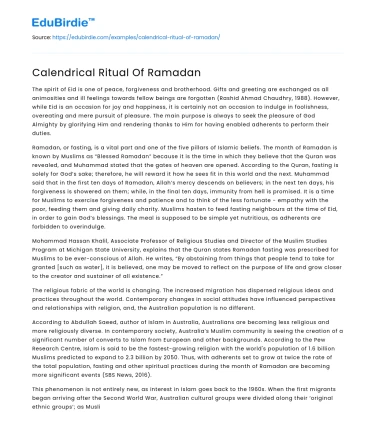The spirit of Eid is one of peace, forgiveness and brotherhood. Gifts and greeting are exchanged as all animosities and ill feelings towards fellow beings are forgotten (Rashid Ahmad Chaudhry, 1988). However, while Eid is an occasion for joy and happiness, it is certainly not an occasion to indulge in foolishness, overeating and mere pursuit of pleasure. The main purpose is always to seek the pleasure of God Almighty by glorifying Him and rendering thanks to Him for having enabled adherents to perform their duties.
Ramadan, or fasting, is a vital part and one of the five pillars of Islamic beliefs. The month of Ramadan is known by Muslims as “Blessed Ramadan” because it is the time in which they believe that the Quran was revealed, and Muhammad stated that the gates of heaven are opened. According to the Quran, fasting is solely for God’s sake; therefore, he will reward it how he sees fit in this world and the next. Muhammad said that in the first ten days of Ramadan, Allah’s mercy descends on believers; in the next ten days, his forgiveness is showered on them; while, in the final ten days, immunity from hell is promised. It is a time for Muslims to exercise forgiveness and patience and to think of the less fortunate - empathy with the poor, feeding them and giving daily charity. Muslims hasten to feed fasting neighbours at the time of Eid, in order to gain God’s blessings. The meal is supposed to be simple yet nutritious, as adherents are forbidden to overindulge.
Save your time!
We can take care of your essay
- Proper editing and formatting
- Free revision, title page, and bibliography
- Flexible prices and money-back guarantee
Mohammad Hassan Khalil, Associate Professor of Religious Studies and Director of the Muslim Studies Program at Michigan State University, explains that the Quran states Ramadan fasting was prescribed for Muslims to be ever-conscious of Allah. He writes, “By abstaining from things that people tend to take for granted [such as water], it is believed, one may be moved to reflect on the purpose of life and grow closer to the creator and sustainer of all existence.”
The religious fabric of the world is changing. The increased migration has dispersed religious ideas and practices throughout the world. Contemporary changes in social attitudes have influenced perspectives and relationships with religion, and, the Australian population is no different.
According to Abdullah Saeed, author of Islam in Australia, Australians are becoming less religious and more religiously diverse. In contemporary society, Australia’s Muslim community is seeing the creation of a significant number of converts to Islam from European and other backgrounds. According to the Pew Research Centre, Islam is said to be the fastest-growing religion with the world's population of 1.6 billion Muslims predicted to expand to 2.3 billion by 2050. Thus, with adherents set to grow at twice the rate of the total population, fasting and other spiritual practices during the month of Ramadan are becoming more significant events (SBS News, 2016).
This phenomenon is not entirely new, as interest in Islam goes back to the 1960s. When the first migrants began arriving after the Second World War, Australian cultural groups were divided along their ‘original ethnic groups’; as Muslims were considered Arabs. Today, however, none of the religious traditions, nor the denominations within them, can be slotted into ‘ethnic’ or national boxes. This is because Australian Muslims have come from countries as diverse as Turkey and Lebanon, as well as parts of Africa including Somalia and Ethiopia.
A number of Australia’s northern neighbours are Muslim. Islam arrived in Southeast Asia as early as the beginning of the eighth-century common era (Islam in Australia, 2003). From then on, its growth and spread continued. By the twelfth century, Islam was an important religion in parts of what we call today Malaysia and Indonesia. According to Abdullah Saeed, Australia’s closest neighbour, Indonesia, is the world’s largest Muslim-majority country. Significant Muslim minorities also exist in the Philippines, Thailand and China.
Ethnic diversity has forced recognition of the reality that not all Australians consider England or Ireland as their cultural homeland. Thus, the religious makeup of Australia has changed gradually over the past 10 years. As a result, the latest national Census of 2016 revealed Australia is a religiously diverse nation with Islam the second most common religion. Religious increase spread across most non-Christian religions, mainly driven by Islam. Australia’s Muslim community was 1.7 percent of the population in 2006, although, had grown to 2.6 percent over the next 10 years (ABS 2016 Census: Religion, 2017). However, nearly a third of Australians reported in the 2016 Census they ‘had no religion’ (ABS 2016 Census: Religion, 2017).
Millions of Muslims around the world mark the calendrical ritual of Ramadan with a month of intense prayer, dawn-to-dusk fasting and nightly feasts. The fast is intended to bring the faithful closer to God and to remind adherents of the suffering of those less fortunate. Thus, the ritual celebration of Ramadan is highly significant to Muslims as it connects people and develops self-appreciation for the perseverance and love Allah provides them.
In Australia, the post-war period brought a dramatic diversification of Australia's ethnic and religious make-up. Many significant developments in Australia's religious communities point to a strongly developing sense of interfaith dialogue and religious harmony from the time of the Second World War to the present.
Recent years have seen unprecedented combined action from Australia's religious leaders and their communities to further interfaith dialogue. Those who initiate interfaith dialogue and events, seek to find peace and harmony among Australia’s diverse populous. The Islamic communities in Australia are continuously growing, and as a result, the religious calendrical of Ramadan is becoming a highly positive and influential celebration in religiously pluralistic Australian society.






 Stuck on your essay?
Stuck on your essay?

